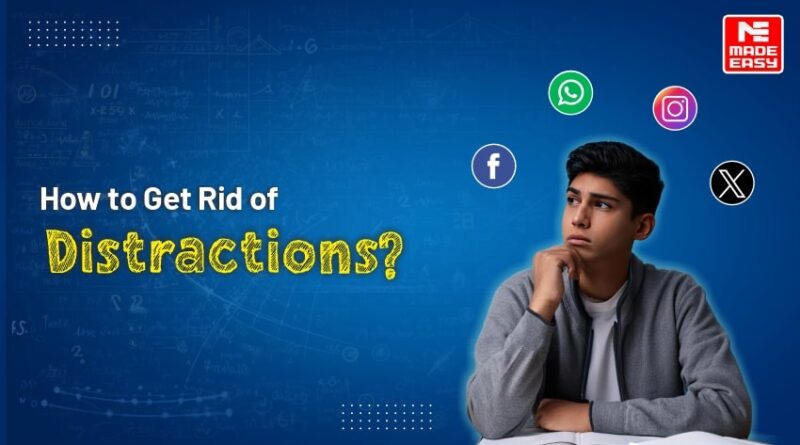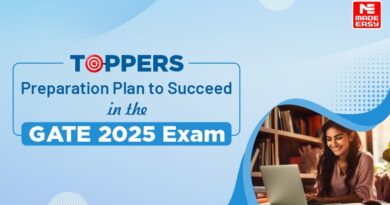How to Get Rid of Distractions?
Distractions are something that you can find everywhere. Whether it’s a constant buzz of notifications, scrolling through videos, or diverting your mind away from your task. Staying focused on your work may sometimes seem challenging but not an impossible task. Distractions not only waste your time but also keep you away from your goals or doing crucial tasks. Our blog is for the readers of every criteria, regardless of your goals. If you are a student trying to learn by focusing on your studies or a working professional learning how you can complete your tasks without any distractions, the blog will positively help you learn to stay less distracted.
Avoid Distractions
‘If you commit to nothing, you will be distracted by everything.’.
If you have understood the lesson that this quote offers, you will implement the learnings from this blog post in a much better way.
Dedication is important for making your dreams a reality, but another factor that holds significance is to avoid distraction and stay focused on the respective study activity. Our lives are made of various seconds, minutes, and hours. Most individuals, especially students, have this in mind. Therefore, they tend to waste a lot of time, as most are used to procrastinating activities. The thought that one has a lot of time to do the same later influences this kind of behavior. Well, this is the biggest lie that the world tells us. We also tend to repeat it quite often to get away with some important work.
Competitive exam aspirants often forget that these excuses more often destroy our lives. In addition, it gives others around us the opportunity to take over our life’s steering wheel. Therefore, the only way to accomplish greatness in life is to remove distractions and focus on recent goals. It will ensure that you carve your path to success.
While statistics show that distractions cause a lack of productivity, it almost seems impossible to get rid of them. This is because the impact of these distractions is deeply rooted inside the individual. It often makes the individual procrastinate on the respective activity. Therefore, you need to understand the subtle difference between breaks and distractions. Checking our cell phones from time to time, going through social media, and starting a little chit-chat with someone is a daily norm that we can’t seem to avoid. Further, we will discuss ways in which you can overcome these distractions. First, we need to understand the basics of distraction.
Table of Contents
What is a distraction?
We often hear about different types of distraction, but have you ever wondered, ‘What is a distraction?’ Distraction is a factor, thing, or aspect that diverts the attention of an individual or a group from the desired focus area. It in turn blocks or diminishes the acceptance of necessary information for the best possible period. According to the Cambridge Dictionary, distraction is a noun that means something that causes someone to stop paying attention to something else.
Until now, you must have known the basics related to ‘What is distraction?’ It is the right moment to sit for some time and list down the distractions and their sources. You must rate it as per the level at which the respective source influences your productivity levels. Now, we will learn to tackle and remove distractions like a pro.
Why do we get distracted?
In our daily lives, we all get distracted. This includes memories, future events, or even uncalled activity. These are distractions at the superficial level, but these distractions start to control our thoughts and actions if allowed.
Every time we focus on something, it uses a measurable amount of glucose and other metabolic resources. Studies have shown that each successive task makes you less effective at the next one, especially if you are doing high-energy tasks. So with all the exhaustion, the body looks for something to feel good; this may be an idea, a thought, or an activity that makes your brain happy. All this happens in a split second, losing sight of the task that we are at the moment involved in before you know it; your brain takes over, and distraction has taken its toll. You are either busy playing a game, scanning through social media posts, or doing anything that makes you happy.
How to focus on studying and not get distracted?
To remove distractions, we first need to understand the different causes of distractions. The factors causing distractions are divided into two categories: internal and external.
- Internal factors: When distraction happens within us, it is an internal factor. It is a result of our thoughts, feelings, and emotions.
- External factors: When the distraction occurs due to some external source, it is called an external distraction. It usually occurs through the people, environment, or objects around us.
We hope all of you have made a list of distractions in your life. Now, we will discuss each in detail to find the solution and get rid of the stress associated with them. The list of distractions for some students may be long, while for others it may be short. Here are the top three reasons that create distractions and make people procrastinate.
People:
The impact of your family, friends, and network can be positive or negative. In the case of distractions, it is usually negative. When you are sitting for important work, either a family member calls you for some work or a friend calls you for some problems. You might also find it distracting when your officemate starts discussing her life with you or somebody else wants your help. In this case, one chooses to respond to distraction because they are afraid that not answering that person’s call may lead to disappointment. So even if you focus on your study-related task or activity, you tend to get distracted.
Here is the solution to deal with this problem: Before you sit to study or do your important work, you must ensure that you put a pause on the immediate communication methods to avoid distractions.
If you cannot ignore it, prepare a note and put it in the area where you work or study. You must prepare yourself mentally to control the tendency to procrastinate.
Phone:
The second distraction is the smartphone and the various apps installed on it. We have forgotten that ‘a phone is a tool that works for you and not against you.’ To avoid distractions from the phone, these proven tips will help you:
- Delete the unnecessary apps: All the apps you need are readily available on modern smartphones. Therefore, instead of keeping the apps that you do not use, delete them to remove distractions. If you need them later, you can reinstall them at that time.
- Turn off the notifications: Every time you sit to study, you will find notifications popping up if your smartphone’s internet is on. This hampers your concentration and distorts you, so turn off the app notifications. You can visit the settings section and close the respective apps’ notifications.
- Turn off the Wi-Fi or cellular data: Instead of being available all the time, set timings in which you will be answering emails and replying to messages. Other than that time, switch off your mobile data or Wi-Fi to avoid any distractions.
- Organize your apps: Keep the final list of apps organized. In this way, you can avoid spending time searching and using unnecessary apps.
Internal
For any distraction, thought is the first trigger. To tackle these thoughts, all you have to do is manage yourself with inspirational self-talk. Always remember: ‘What you say is what you feel. So why not choose to say good?’.
- Question yourself: Ask yourself if you have anything important to do at a particular moment. If the answer is yes, do not let that thought evolve into a distraction.
- Manage where you sit: Sit in a peaceful place. Make sure you do not have interference from any other sources. This includes family members, pets, or other factors.
- Stay aware: Always be aware of what you think and do. As soon as you feel like you are losing focus, tell yourself that you need to remove distractions from your surroundings.
While these distractions are very normal, we have seen how each can be easily dealt with before or during the study sessions. Now, let us discuss some general tips to avoid distractions.
How to focus on your studies?
The below-mentioned effective tips will help you stay focused on your respective aim. In this way, you will not let minor distractions divert you from your goals.
1. Remove Temptations:
Temptations are nothing but a gateway to distractions. Therefore, if you avoid or remove the temptations, you will never be distracted. To do that, you have to make a to-do list of your temptations and form habits to remove distractions. As discussed earlier, once you understand how much energy your brain is consuming while doing a particular task, you will better understand the need to remove temptations. If your brain focuses on one particular thing that is in front of you, it consumes less effort. On the other hand, if you focus on two aspects at one time, you will find it difficult to get the real output from each of the activities. Therefore, the best step is to switch off these devices and remove distractions.
2. Set Objectives:
Every day, when you wake up, have a plan and set objectives for the day. These objectives will provide you with a pathway, guide you through the day, and help you avoid distractions. Do not set too many goals or objectives. It will help you build a peaceful environment and remove distractions wherever possible. In this way, you will get rid of stress and focus on your objectives. It will help you avoid distractions in the best possible manner. If you have fewer objectives, you will work with greater intention, and your mind is less likely to wander.
3. Short Time Frame
Parkinson’s Law says that “work tends to expand to fill the time we have available for its completion.” Therefore, set a shorter duration for the completion of each task. It is a natural human tendency that the more time we give to a task, the more we are likely to get distracted. This is because the respective aspirant will engage in different distractions in the extra time. Our mind is wired to conserve as much energy as possible. Setting a difficult deadline will help you avoid distractions and boost your productivity. In this way, you can remove distractions and avoid procrastination at the same time.
4. Monitor your Timing
One of the recent Harvard studies shows that nearly 50% of our waking time is spent thinking about random things. The key to avoiding distractions and increasing productivity is to keep track of your time and your mind. Monitor the time when your mind is getting distracted and bring its attention back after engaging in some useful activity.
While providing a small time frame is important, monitoring the time is also of utmost importance. One effective technique to monitor time is the “Pomodoro Method.’’ In this technique, you set a timer and bring your complete focus to a task for a specific duration. Then you take a break for a particular period. For instance, work for 45 minutes and then take a break for 15 minutes.
5. Get rid of stress
Stress also plays a major role in distraction. We often tend to sit and study with a lot of stress and mental baggage. This not only distracts us but also compromises our productivity. Therefore, make sure you calm yourself down, get enough sleep, and relax your mind to reduce the body’s stress response. You can also practice breathing exercises and meditation to break the cycle of stress and distraction. Eventually, you will get rid of stress and focus on the important aspects.
We all face distractions in different phases of life. However, we often forget that it is upon us to deal with such aspects with maturity and let no distractions affect our performance in the exams. Therefore, while preparing for any exam or appearing in one, ensure that you take over all your distractions and come out strong and productive. It will not only help you clear the exam with good marks but also ensure a bright future and a happy tomorrow.
Is distraction actually a bad thing?
Distraction is considered a negative word, which is somehow correct. Distracting while driving, getting involved in something to delay work, or indulging oneself in unhealthy habits like alcohol or smoking can have negative consequences.
Although breaks and distractions are related, they are not the same thing. Breaks are considered healthy when they are taken consciously. Diverting yourself from an important work or activity is a distraction. A break is something that gives you pause and takes you out of a monotonous task or routine, which can negatively affect your unconscious way of thinking. It’s a moment to refresh, step back, and return with a clearer mind.
Breaks should be a simple and effective way to refresh for a healthy start-over. A long study session or sitting back in a chair with no break from screen time requires a break, like going for a walk, getting up and stretching, or maybe taking naps. Reading a book, solving a crossword puzzle, talking to your friends or family, watching a movie or inspiring documentary, and many more are some healthy breaks that require little effort and are considered healthy.
Frequently Asked Questions (FAQs)
Below are some of the commonly asked questions to overcome distractions and laziness, offering insights to manage distractions and have a better focus.
1. What is the cause of distraction?
Ans. Many things can lead to distractions, such as losing interest in the main task, being unable to focus for a variety of reasons, or the seriousness of the attention grabber.
2. Is break and distraction the same thing?
Ans. Breaks and distractions are related but not the same thing. A break refers to a pause from work or activity. However, distraction is what diverts your attention from work or an activity.
3. How can I get better focus?
Ans. Identifying distractions and eliminating them, practicing meditation and mindfulness, establishing a sleep pattern, taking short breaks, maintaining a healthy diet, and exercising are some impactful techniques to get better at focusing on work.
4. Is distraction a bad thing?
Ans. Distractions are often considered a bad thing, but they can be a good thing when they are conscious and healthy.
5. How to overcome laziness?
Ans. Making your goals manageable, avoiding distractions, exercising, and sleeping well are some ways to overcome laziness.
Dear Aspirants,
Your preparation for GATE, ESE, PSUs, and AE/JE is now smarter than ever — thanks to the MADE EASY YouTube channel.
This is not just a channel, but a complete strategy for success, where you get toppers strategies, PYQ–GTQ discussions, current affairs updates, and important job-related information, all delivered by the country’s best teachers and industry experts.
If you also want to stay one step ahead in the race to success, subscribe to MADE EASY on YouTube and stay connected with us on social media.
MADE EASY — where preparation happens with confidence.

MADE EASY is a well-organized institute, complete in all aspects, and provides quality guidance for both written and personality tests. MADE EASY has produced top-ranked students in ESE, GATE, and various public sector exams. The publishing team regularly writes exam-related blogs based on conversations with the faculty, helping students prepare effectively for their exams.





Thank you!! That hurt yourself or pinch yourself thing is really true
The blog is very helpful to me.but iam distracted by YouTube.because it has free study videos.but it makes me diviate in to other entertainment videos on youtube.how can I get rid off.please help
Thank you Sir/Madam,
This article provided much information and boosted our brain to be focused.
Motivational Article.
Dear K Revanth,
We’re glad to hear that the article helped boost your focus and motivation. Your kind words inspire us to keep sharing valuable content. Stay motivated and keep growing!